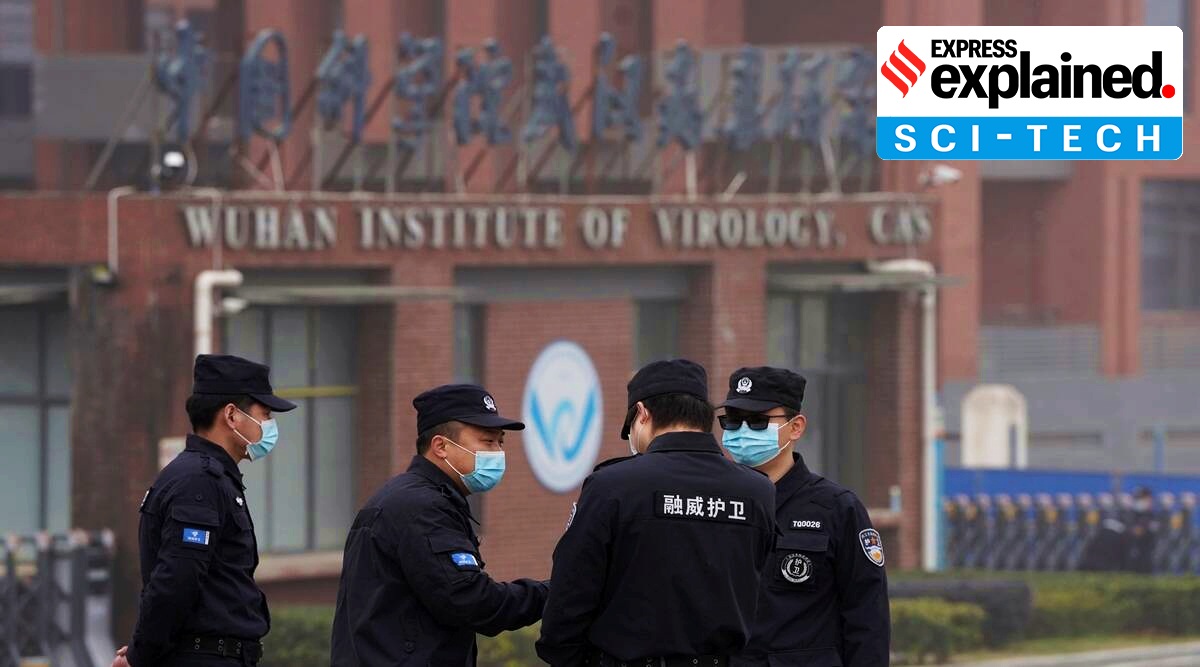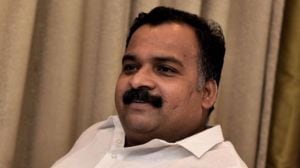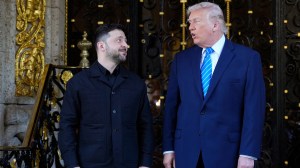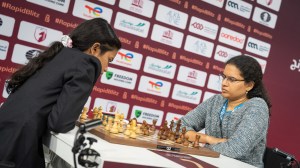Covid-19 of ‘natural origin’ or ‘lab leak’? A tale of two theories
The 'natural origin' vs 'lab leak' debate emerged almost simultaneously with the pandemic. The latest statements by US agencies have reignited the controversy. Members of the scientific community themselves have contributed to the muddying of waters.
 Security personnel gather near the entrance of the Wuhan Institute of Virology during a visit by the World Health Organization team in Wuhan in China's Hubei province on Wednesday, Feb. 3, 2021. (AP Photo/Ng Han Guan)
Security personnel gather near the entrance of the Wuhan Institute of Virology during a visit by the World Health Organization team in Wuhan in China's Hubei province on Wednesday, Feb. 3, 2021. (AP Photo/Ng Han Guan) The debate over the origins of SARS-CoV-2 has been reignited with revelations that the United States Department of Energy has changed its opinion and now believes that the virus that caused the Covid-19 pandemic most likely leaked from a laboratory in Wuhan, China, and did not emerge organically.
The department was previously undecided on this issue, according to a report in the Wall Street Journal, which also said that this assessment, apparently based on new evidence, was made with “low confidence”.
Then in a television interview on Tuesday, Christopher Wray, Director of the Federal Bureau of Investigation (FBI) said his agency too was of the opinion that the origins of the pandemic was “most likely” a “potential lab incident in Wuhan”.
These are just the latest assessments of the origins of the coronavirus, which has been the subject of fierce contestation and political discussion since the beginning of the pandemic in early 2020. The World Health Organisation (WHO) has studied it, and so have several scientific groups, individual scientists, government agencies, and independent researchers.
The matter has not been settled — and it is unlikely to be settled now, given how contentious it has been. China’s foreign ministry responded to Wray’s statements by accusing the US of “political manipulation”, and declared “the conclusions they have reached have no credibility to speak of”.
A tale of two theories
The debate is over whether the coronavirus emerged naturally — possibly jumping from an animal host to humans in the same way as the SARS-1 virus in 2002 — or accidentally ‘escaped’ or ‘leaked’ from the Wuhan Institute of Virology (WIV), the institute in the city where researchers had been working with coronaviruses for several years.
There are people who even believe that the virus was a bio-weapon deliberately released by China, but this theory has not received backing from any serious quarters.
The reason why the origin question is relevant and important is that it helps tremendously in the efforts to prevent another such virus outbreak.
The fact that the first infections were reported from Wuhan, home to the WIV, a well known centre for coronavirus research, presented itself as the obvious, and not entirely unreasonable, basis for the assertion that an engineered virus had spilled over from the laboratory.
But this coincidence is not the entire foundation for this theory. Over the subsequent months, plenty of scientific facts were unearthed, which can be explained far better, and with much greater probability, by the ‘lab leak’ theory.
What gave the most credence to this theory was the vehemence with which it was sought to be denied, and the rather deceitful conduct of a few scientists involved in the denial.
A statement by a group of scientists published in The Lancet on February 18, 2020 called it a “conspiracy”, and claimed that evidence was “overwhelmingly” conclusive that the virus had emerged naturally.
In an article in Nature Medicine on March 17, 2020, another set of scientists claimed that their analysis “clearly” showed that the virus was “not a laboratory construct or a purposefully manipulated virus”.
These two articles, published in reputable scientific journals very early in the pandemic when sufficient information or analysis could not have been available, almost completely discounted the possibility of the virus escaping from the laboratory, and shaped the narrative around the origins of the virus.
Dishonesty — and evidence
It emerged only later that The Lancet statement was signed, and organised, by Peter Daszak, a scientist with deep connections to the WIV. Daszak was president of New York-based EcoHealth Alliance, which directly funded coronavirus research at WIV. This conflict of interest was never questioned by the colleagues who signed the letter, the editors of the journal, or the wider scientific community which was aware of Daszak’s connections with WIV.
The statement still remains on the website of the journal, and Daszak has not been reprimanded in any way for wilful concealment of facts and misleading scientific opinion. Daszak, in fact, was part of the WHO team that was sent to Wuhan to investigate the origins question in 2021.
Thanks to some enterprising and inquisitive researchers, including a few based in India, a lot more information and data was released on the Internet that added evidence to the ‘lab leak’ theory, and also exposed efforts to hide or remove access to relevant Chinese databases and information by Chinese authorities.
While the evidence for a ‘lab leak’ is still not conclusive — and the recent disclosures by US agencies are unlikely to change that — it does remain the far simpler explanation, not least because unlike in the case of SARS-1 or MERS, the theory of ‘natural emergence’ of the virus is yet to be established more than three years after the outbreak.
In fact, the evidence for natural emergence continues to be far more disingenuous, despite the publication of two comprehensive studies last year that strongly favour the theory that the virus passed on to humans from animals.
Value of scientific opinion
The origins controversy is not the only episode during the Covid-19 epidemic in which scientists have indulged in questionable behaviour.
As is becoming increasingly evident, scientific assessments and opinion offered by individual scientists as well as some scientific institutions on a variety of issues relating to the pandemic — mask mandates, vaccine effectiveness, mortality estimations and more — was not based entirely in science.
There have been instances when scientists have been economical with the truth, have seemingly batted for corporate interests, or have simply fallen to the temptation of narrative-building. These are things that usually journalists and politicians are accused of, not scientists.
The damage from this could come in the form of erosion of trust in scientists. Some of this is already evident, with even straightforward scientific advice being questioned or ridiculed. Scientists take pride in holding themselves to higher standards, and justifiably so. But the fact that there has been no condemnation or reprimand, or even acknowledgement of certain kinds of behaviour, makes a dent in that image.
- 01
- 02
- 03
- 04
- 05






































